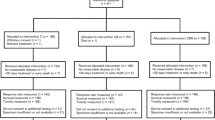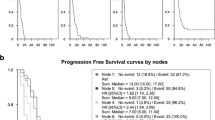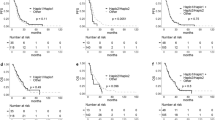Abstract
Although anti-VEGF therapy is widely used in high-grade gliomas, no predictor of response or toxicity has been reported yet. We investigated here the association of the functional single nucleotide polymorphism (SNP) rs2010963, located in the 5′ untranslated terminal region of the VEGFA gene, with survival, response to bevacizumab (BVZ) and vascular toxicity. The rs2010963 was genotyped by Taqman assay in blood DNA from 954 glioma patients with available survival data, including 225 glioblastoma (GBM) patients treated with BVZ. VEGFA plasma levels were assessed by ELISA in 87 patients before treatment. Thrombo-hemorragic adverse events were recorded during BVZ treatment or not, and in an independent population of 92 GBM patients treated with temozolomide. The CC genotype was associated with the occurrence of thrombo-hemorragic events (CC 25 versus CG 13.5 and GG 5.2 %; P = 0.0044) during BVZ. A similar but weaker and non significant trend was observed in patients not receiving BVZ. A CC genotype was associated with higher levels of plasma VEGFA at baseline (107.6 versus 57.50 pg/mL in heterozygotes (CG) and 52.75 pg/mL in GG patients, P = 0.035 and P = 0.028 respectively). The CC genotype tended to be associated to longer PFS when treated with BVZ (P = 0.05), but not when treated with the temozolomide treatment. Our data suggest that the rs2010963 genotype is associated with longer PFS, higher risk of vascular events in recurrent GBM especially treated with BVZ, and higher plasma VEGFA concentration. It may help to identify patients at risk of vascular adverse events during BVZ treatment.



Similar content being viewed by others
Abbreviations
- VEGFA:
-
(Vascular endothelial factor A)
- OS:
-
(Overall survival)
- PFS:
-
(Progression free survival)
- W.H.O.:
-
(World Health Organization)
- KPS:
-
(Karnofsky performance status)
- SNP:
-
(Single nucleotide polymorphism)
References
Kunnakkat S, Narayana A (2011) Bevacizumab in the treatment of high-grade gliomas: an overview. Angiogenesis 14:423–430
Jensen RL (1998) Growth factor-mediated angiogenesis in the malignant progression of glial tumors: a review. Surg Neurol 49:189–195; discussion 196
Friedman HS, Prados MD, Wen PY et al (2009) Bevacizumab alone and in combination with irinotecan in recurrent glioblastoma. J Clin Oncol 27:4733–4740
Kreisl TN, Kim L, Moore K et al (2009) Phase II trial of single-agent bevacizumab followed by bevacizumab plus irinotecan at tumor progression in recurrent glioblastoma. J Clin Oncol 27:740–745
Vredenburgh JJ, Desjardins A, Herndon JE 2nd et al (2007) Bevacizumab plus irinotecan in recurrent glioblastoma multiforme. J Clin Oncol 25:4722–4729
Gil MJ, de Penas Las R, Reynes G et al (2012) Bevacizumab plus irinotecan in recurrent malignant glioma shows high overall survival in a multicenter retrospective pooled series of the Spanish neuro-oncology research group (GEINO). Anticancer Drugs 23:659–665
GKB P. http://www.pharmgkb.org/ [online]. Available at: http://www.pharmgkb.org/
Brogan IJ, Khan N, Isaac K, Hutchinson JA, Pravica V, Hutchinson IV (1999) Novel polymorphisms in the promoter and 5′ UTR regions of the human vascular endothelial growth factor gene. Hum Immunol 60:1245–1249
Tischer E, Mitchell R, Hartman T et al (1991) The human gene for vascular endothelial growth factor. Multiple protein forms are encoded through alternative exon splicing. J Biol Chem 266:11947–11954
Minchenko A, Salceda S, Bauer T, Caro J (1994) Hypoxia regulatory elements of the human vascular endothelial growth factor gene. Cell Mol Biol Res 40:35–39
Schultz A, Lavie L, Hochberg I et al (1999) Interindividual heterogeneity in the hypoxic regulation of VEGF: significance for the development of the coronary artery collateral circulation. Circulation 100:547–552
Jain L, Vargo CA, Danesi R et al (2009) The role of vascular endothelial growth factor SNPs as predictive and prognostic markers for major solid tumors. Mol Cancer Ther 8:2496–2508
Watson CJ, Webb NJ, Bottomley MJ, Brenchley PE (2000) Identification of polymorphisms within the vascular endothelial growth factor (VEGF) gene: correlation with variation in VEGF protein production. Cytokine 12:1232–1235
Zhai R, Liu G, Zhou W et al (2008) Vascular endothelial growth factor genotypes, haplotypes, gender, and the risk of non-small cell lung cancer. Clin Cancer Res 14:612–617
Sfar S, Hassen E, Saad H, Mosbah F, Chouchane L (2006) Association of VEGF genetic polymorphisms with prostate carcinoma risk and clinical outcome. Cytokine 35:21–28
Li R, Zhao Y, Fan W et al (2011) Possible association between polymorphisms of human vascular endothelial growth factor a gene and susceptibility to glioma in a Chinese population. Int J Cancer 128:166–175
Stupp R, Mason WP, van den Bent MJ et al (2005) Radiotherapy plus concomitant and adjuvant temozolomide for glioblastoma. N Engl J Med 352:987–996
Wen PY, Macdonald DR, Reardon DA et al (2010) Updated response assessment criteria for high-grade gliomas: response assessment in neuro-oncology working group. J Clin Oncol 28:1963–1972
Louis DN, Ohgaki H, Wiestler OD, Cavenee WK (2007) WHO Classification of tumours of the central nervous system. Acta Neuropathol 114:97–109
Petrovic D, Verhovec R, Globocnik Petrovic M, Osredkar J, Peterlin B (2007) Association of vascular endothelial growth factor gene polymorphism with myocardial infarction in patients with type 2 diabetes. Cardiology 107:291–295
Awata T, Inoue K, Kurihara S et al (2002) A common polymorphism in the 5′-untranslated region of the VEGF gene is associated with diabetic retinopathy in type 2 diabetes. Diabetes 51:1635–1639
Inoue M, Itoh H, Ueda M et al (1998) Vascular endothelial growth factor (VEGF) expression in human coronary atherosclerotic lesions: possible pathophysiological significance of VEGF in progression of atherosclerosis. Circulation 98:2108–2116
Petrovic MG, Korosec P, Kosnik M et al (2008) Local and genetic determinants of vascular endothelial growth factor expression in advanced proliferative diabetic retinopathy. Mol Vis 14:1382–1387
van der Meer P, De Boer RA, White HL et al (2005) The VEGF +405 CC promoter polymorphism is associated with an impaired prognosis in patients with chronic heart failure: a MERIT-HF substudy. J Card Fail 11:279–284
Vailati FB, Crispim D, Sortica DA, Souza BM, Brondani LA, Canani LH (2012) The C allele of -634G/C polymorphism in the VEGFA gene is associated with increased VEGFA gene expression in human retinal tissue. Invest Ophthalmol Vis Sci 53:6411–6415
Nalluri SR, Chu D, Keresztes R, Zhu X, Wu S (2008) Risk of venous thromboembolism with the angiogenesis inhibitor bevacizumab in cancer patients: a meta-analysis. JAMA 300:2277–2285
Hapani S, Sher A, Chu D, Wu S (2010) Increased risk of serious hemorrhage with bevacizumab in cancer patients: a meta-analysis. Oncology 79:27–38
Acknowledgments
Work supported by a Grant from the Institut National du Cancer (INCa; Angiogli- RAFc0209). A.L. Di Stefano received an investigator fellowship from PRIN 2010ZESJWN_008. The research leading to these results has received funding from the program “investissements d’avenir” ANR-10-IAIHU-06. The authors are indebted to Alexandru Agachi for English Editing.
Conflict of interest
None.
Author information
Authors and Affiliations
Corresponding author
Electronic supplementary material
Below is the link to the electronic supplementary material.
Rights and permissions
About this article
Cite this article
Di Stefano, A.L., Labussiere, M., Lombardi, G. et al. VEGFA SNP rs2010963 is associated with vascular toxicity in recurrent glioblastomas and longer response to bevacizumab. J Neurooncol 121, 499–504 (2015). https://doi.org/10.1007/s11060-014-1677-x
Received:
Accepted:
Published:
Issue Date:
DOI: https://doi.org/10.1007/s11060-014-1677-x




